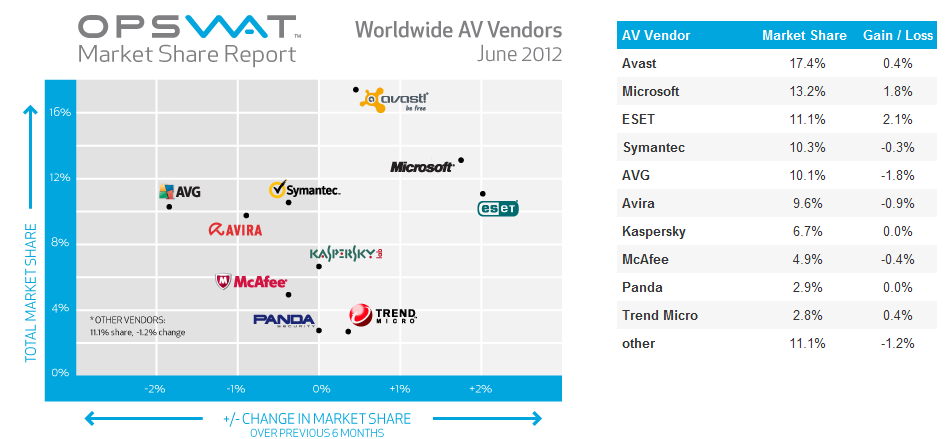Which is the most popular antivirus software?
In an over-crowded antivirus software market, end and corporate users are often finding it difficult to differentiate between a value-added market proposition, next to the "me too" vendors of solutions. As in every other market segment, any scientific insight into the market share of various vendors offers an invaluable perspective into the market dynamics, what are customers purchasing, and most importantly, are they living in a world of 'false feeling of security'.
Using a data set consisting of 120,000 data points, researchers from OPSWAT recently released an informative overview of the antivirus market, answering an important question - which is the most popular antivirus vendor?
According to their findings, that's avast! Free Antivirus, followed by Microsoft Security Essentials and ESET NOD32 Antivirus.
Detailed market share statistics:
- Avast - 17.4% worldwide market share
- Microsoft - 13.2% worldwide market share
- ESET - 11.1% worldwide market share
- Symantec - 10.3% worldwide market share
- AVG - 10.1% worldwide market share
- Avira - 9.6% worldwide market share
- Kaspersky - 6.7% worldwide market share
- McAfee - 4.9% worldwide market share
- Panda - 2.9% worldwide market share
- Trend Micro - 2.8% worldwide market share
- Other - 11.1% worldwide market share
Microsoft is the market leader in North America, followed by Symantec and AVG. Not surprisingly, the market leading avast! Free Antivirus is relying on the so called "freemium" business model, where the company grows and gains market share by offering a free alternative of their software, and earns revenue thanks to the successful conversion of free users to paid ones. Earlier this year, the company announced that it has 150 million active users worldwide, a clear indication of a working "freemium" business model.
Go through related Image Galleries:
- Image Gallery: Avast! Antivirus office in Prague, Czech Republic
- Image Gallery: The (European) Antivirus market - current trends
Just how relevant is antivirus nowadays? In a recently released study entitled "Measuring the Cost of Cybercrime", researchers argue that less money should be spent on purchasing antivirus software, and more money in tracking down and prosecuting cybercriminals. Next to these conclusions, F-Secure's Mikko Hypponen recently admitted that antivirus software failed in Stuxnet and Flame's cases, provoking more discussion on the actual applicability of antivirus software in today's mature cybercrime ecosystem.
What do you think? In antivirus software still relevant in the age of Stuxnet, Duqu and Flame, the so called poster kids of the DIY targeted attack toolkits and weaponized malware releases? Do think free antivirus is offering a 'false feeling of security' compared to subscription based license models?
TalkBack!
Find out more about Dancho Danchev at his LinkedIn profile, or follow him on Twitter.
